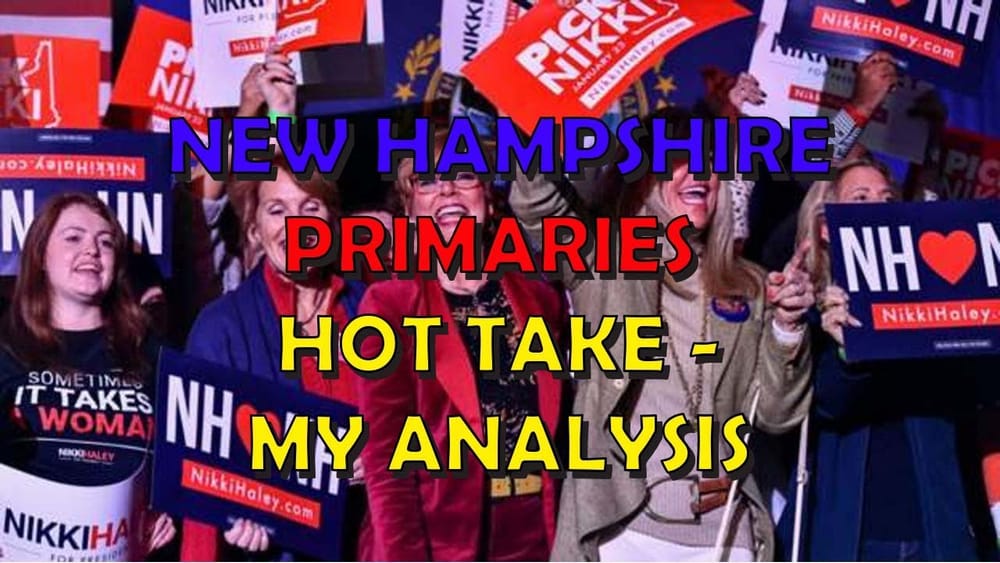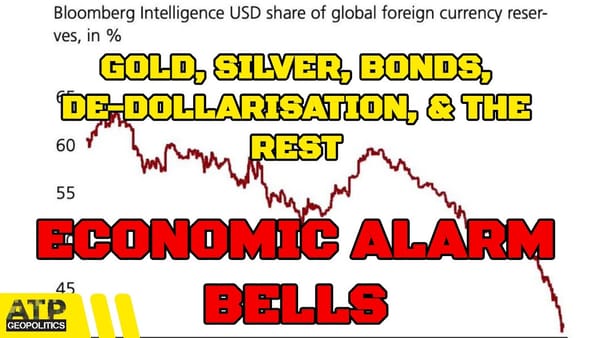New Hampshire Primaries: Hot Take & Analysis
Table of Contents 📖
"The further he goes to the right, the more he loses the center. Now, he's never going to get Democrats... you are not going to attract Democrats over by going more and more to MAGA."
Hello Team
🎦 00:00-00:03⏩
Jonathan opens the video with his usual "Hello team" greeting, introducing himself and the topic of the video, a hot take analysis of the New Hampshire Primaries.
Return to top⤴️
New Hampshire Primaries Results and Implications
🎦 00:03-02:29⏩
Jonathan discusses Trump's victory over Nikki Haley in the New Hampshire Republican primary. He notes that Trump won by a significant but not insurmountable margin. This raises questions about Haley's future in the race and whether her donors will continue to support her. Jonathan believes it's important for Haley to remain as a voice for moderate Republicans and to offer an alternative to Trump's narrative. He observes that the results in New Hampshire might not reflect the true gap between Trump and Haley among registered Republicans, as independent voters likely influenced the outcome.
Return to top⤴️
Takeaways from CNN and the Role of Moderates
🎦 02:29-05:29⏩
Jonathan delves into CNN's takeaways from the New Hampshire primaries. He highlights Trump's desire to be the sole candidate and questions whether Haley's presence is beneficial for democracy and representation. Jonathan argues that Haley's anti-Trump stance is crucial and wonders about the size and resilience of the anti-Trump vote within the Republican Party. He also discusses Chris Christie's performance, praising his honesty while expressing concerns about the pressure on Republicans to conform to the Trumpist base.
Return to top⤴️
Trump's Likely Victory and the 2024 Election
🎦 05:29-06:00⏩
Jonathan predicts that, despite legal troubles, Trump is poised to win the Republican nomination. However, he expresses skepticism about Trump's chances in the 2024 general election. He believes a Democratic victory is more likely due to several factors.
Return to top⤴️
Impact of the Repeal of Roe v. Wade
🎦 06:00-07:40⏩
Jonathan argues that the repeal of Roe v. Wade has galvanized opposition and hurt Republicans at the ballot box. He highlights the issue's potency, noting that vocal pro-life groups don't necessarily represent the majority. He believes that if Democrats make reproductive rights a central campaign theme, they have a strong chance of winning in 2024.
Return to top⤴️
The Importance of the Middle Ground in Two-Party Systems
🎦 07:40-11:01⏩
Jonathan transitions to a broader discussion about two-party systems, drawing parallels between the US and the UK. He explains how politicians in such systems often target the "middle ground" or swing voters to secure victory. He cites examples like Bill Clinton and Tony Blair, who tailored their campaigns to appeal to this crucial demographic.
Return to top⤴️
The Limitations of the US Two-Party System
🎦 11:01-11:30⏩
Jonathan critiques the US two-party system, arguing it's a narrow form of democracy that often fails to represent the electorate fully. He believes this system compels both parties to fight over the center, particularly on issues like abortion.
Return to top⤴️
Trump's Stance on Abortion
🎦 11:30-12:13⏩
Jonathan examines Trump's stance on abortion, characterizing it as inconsistent and opportunistic. He argues that Trump lacks strong personal views on the subject and tailors his rhetoric to what he perceives his base wants to hear.
Return to top⤴️
The Dangers of Trump's MAGA Base
🎦 12:13-13:07⏩
Jonathan expresses concern that Trump, if nominated, will be emboldened by his MAGA base to adopt increasingly extreme positions. He argues this will alienate moderate voters and hurt his chances in the general election.
Return to top⤴️
Biden's Potential Path to Victory
🎦 13:07-14:56⏩
Jonathan outlines a potential path to victory for Biden, suggesting that by appealing to moderate voters turned off by Trump's extremism, he can secure a second term. He highlights the risk for Republicans of losing the center ground, particularly if they cannot effectively demonize the Democrats.
Return to top⤴️
The False Narrative of a "Radical Left"
🎦 14:56-16:22⏩
Jonathan criticizes attempts by some Republicans to portray Democrats, particularly those like Alexandria Ocasio-Cortez and the Justice Democrats, as "radical leftists." He argues this is a mischaracterization designed to scare moderate voters, and that in reality, the Democratic Party's positions are fairly standard on the global political spectrum.
Return to top⤴️
Potential Campaign Issues for Republicans
🎦 16:22-17:13⏩
Jonathan speculates on potential campaign issues for Republicans. He argues that without Roe v. Wade and with Biden potentially adopting a tougher stance on immigration, Republicans may be forced to rely on culture war issues to mobilize their base.
Return to top⤴️
The Importance of Appealing to Moderates
🎦 17:13-18:24⏩
Jonathan reiterates the importance of appealing to moderate voters in the US election. He emphasizes that Trump's divisive rhetoric is unlikely to win over this crucial demographic, while a more moderate Democrat like Biden stands a better chance.
Return to top⤴️
Trump's Divisive Rhetoric and Impact on the Electorate
🎦 18:24-19:26⏩
Jonathan criticizes Trump's divisive rhetoric, arguing it is harmful to American politics and will likely lead to a more fractured electorate. He expresses concern that another Trump presidency would exacerbate existing divisions and make finding common ground even more difficult.
Return to top⤴️
The Need for a Younger Democratic Candidate
🎦 19:26-21:55⏩
Jonathan acknowledges concerns about Biden's age and suggests that the Democrats would benefit from a younger candidate. He proposes individuals like Jamie Raskin, Gavin Newsom, and Pete Buttigieg as potential alternatives, highlighting their strengths and weaknesses. However, he expresses doubt about Buttigieg's chances due to persistent homophobia within the US electorate.
Return to top⤴️
Challenges for Democrats with the Far Left
🎦 21:55-22:53⏩
Jonathan discusses potential challenges for Democrats in appealing to their far-left base, particularly on issues related to Israel and Palestine. He notes instances of dissent within the party and suggests that while these voters are unlikely to switch to the Republicans, they might choose not to vote or vote for a third-party candidate, effectively wasting their vote in the US two-party system.
Return to top⤴️
Jonathan's Final Thoughts on the Primaries
🎦 22:53-24:13⏩
In his closing remarks, Jonathan reiterates his belief that another Trump presidency would be detrimental to American politics and global stability. He expresses a desire for a return to more moderate political discourse and a less polarized electorate. However, he remains unconvinced that such a shift is likely, lamenting the deeply entrenched divisions within the US political landscape.
Return to top⤴️




